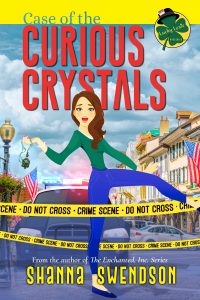Tomorrow is release day for Case of the Curious Crystals. If you pre-ordered the e-book, it should hit your devices tonight. I don’t know how the time zone things work for when they decide it’s release day.
I have to say that writing a series in which most of the socializing takes place in a Mexican restaurant has been challenging during a time when eating in restaurants isn’t a great idea. I’ve ended up finding ways to improvise at home, though it still lacks that communal experience of gathering with friends and family. I think my last time in a Mexican restaurant may have been just before Thanksgiving last year with my parents. Then I was sick for most of December, busy working on books in January and February, and then the lockdown hit.
But in the meantime, I looked up recipes to make some of my favorites. When I didn’t want to go grocery shopping to buy ready-made chili con queso or the ingredients for the Velveeta and Ro-Tel dip that’s a standard at parties around here, I found a good recipe from the family that runs one of my neighborhood places. I’ve tinkered with it a bit and cut it down so that I don’t end up with a vat of cheese, and now it’s become a staple for me. It uses ingredients I usually have handy, and because it doesn’t use a can of anything, I can make it in smaller quantities. So, here’s my chili con queso for one recipe:
Start by heating half a tablespoon of oil in a heavy small pan over medium heat. Then saute 1/4 cup minced sweet onion and 1/4 cup finely minced jalapeño pepper (about one average pepper).
I should note here that I’m not a fan of really hot, spicy things (I buy mild salsa), and in spite of using a whole pepper, this isn’t all that spicy. Just make sure to remove the ribs and seeds, and I have to use gloves to cut up a pepper. If you want it hotter, use a hotter kind of pepper. If you want it milder, you can use diced canned green chilis, but you’ll put those in later.
When the onion is translucent, add 1/2 teaspoon cumin, 1/2 teaspoon garlic powder, 1/4 teaspoon salt, and 1 tablespoon of corn starch. Cook, stirring, for about two minutes, until you can really smell the cumin. Then stir in 1/2 cup of chicken broth (if you want to make it vegetarian, you can probably use vegetable broth. I haven’t tried it that way, but you don’t really taste the broth, so it should work). I use the refrigerated bouillon concentrate so I don’t have to open a can just to get half a cup. Cook, stirring, about three minutes until it’s thick and bubbly. You may need to lower the heat a little.
Then add 4 slices of American cheese, chopped up. Yes, it needs to be American, those individually wrapped slices used in grilled cheese. You have to get over your cheese snobbery here. Anything else will give you a different texture. It will get stringy and oily. I once threw in just a little bit of chipotle cheddar, and it didn’t work. Also add 1/2 cup chopped tomato (I use 1 small Roma tomato). If you’re using the canned chilis, add them here (drain them first). Stir it all together until the cheese is melted into a smooth sauce. If it’s too thick, add a little more broth. If it’s too thin, add a little more cheese, but note that it will thicken up more as soon as you take it off the stove.
I try to keep it warm to eat by warming the ceramic bowl I serve it in by rinsing it out with hot water. If you’ve got a fondue pot, this would be a good time to use it to keep things warm, or maybe one of those tiny crock pots.
You can customize this by using different kinds of peppers, adding cooked ground meat, topping with sour cream or guacamole, etc.
I seldom get queso in restaurants because once I eat it, I’m not hungry for the meal. At home, I eat it as a meal. I’ll have a salad to go with it and mix in some carrot sticks in addition to the chips for dipping.
This recipe makes about two servings. I make sure to put a serving in a bowl so I don’t scarf down the whole thing at once (and then feel sick later). It reheats pretty well in the microwave if there’s any left over. I heat it with medium power instead of on high.
In my next newsletter, planned for Friday, I’ll share my recipe for cheese enchiladas.

 Book two in my mystery series, Case of the Curious Crystals is now available. I’ve drafted book 3 and will start revisions next week, so I’ll figure out then how much work it needs and that will tell me when it’s likely to come out.
Book two in my mystery series, Case of the Curious Crystals is now available. I’ve drafted book 3 and will start revisions next week, so I’ll figure out then how much work it needs and that will tell me when it’s likely to come out.